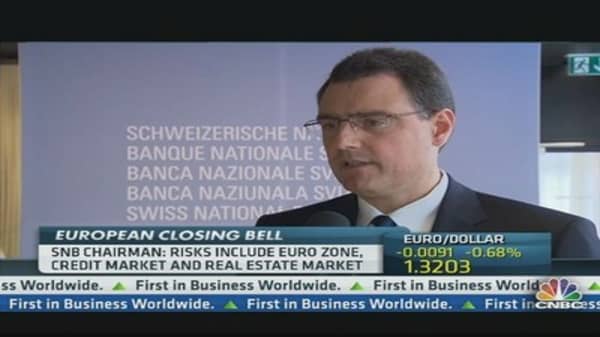The Swiss National Bank said it was far from ready to end its unconventional policy measures, on Thursday, despite the U.S. Federal Reserve signaling it will soon start scaling back its asset purchasing program.
(Read more: After the Fed — What's the Market's Next Move?)
"The exit is still so far away, we have not even thought about how to communicate it," said Swiss National Bank (SNB) Chairman Thomas Jordan in a press conference.
The SNB opted to retain its exchange rate cap on the swiss franc of 1.20 per euro on Thursday. The cap was introduced in September 2011, after safe-haven inflows caused the swiss franc to appreciate steeply, threatening the health of Swiss exporters.
"The minimum exchange rate is still absolutely necessary for Switzerland. Only with the minimum exchange rate we can have adequate monetary conditions for Switzerland," Jordan told CNBC in Switzerland.
He added that capital inflows into Switzerland would continue, despite the cap. "Given the continued uncertainty in financial markets, and the fact that the swiss franc is a safe haven currency, it is still possible that you have inflows into Switzerland," Jordan said.
However, Barclays analysts argued in a research note this week that "expensive hedges against gloomy scenarios should be dumped".
(Read more: Global Markets Feel the Fed Sting)
"We do not think it makes sense for the $500 billion inflows to stay in the swiss franc, in the economic circumstances that likely lie ahead," the analysts wrote, adding that short Swiss franc positions had limited downside while the currency continues to trade close to the SNB exchange rate floor.
Meanwhile, Jordan said he was willing to consider negative interest rates as another means to boost the economy.
"We do not exclude any measures that could be helpful to maintain adequate monetary conditions in Switzerland. Negative interest rates are not something that we can exclude from our toolbox," he said.
(Read more: Swiss panel recommends exchange of bank data with EU)
The biggest danger to the Swiss economy was the instability and economic difficulties in the euro zone, Jordan added.
"There are many risks in the euro zone, and that can put the swiss franc under pressure. We also have domestic risks: The credit market, the mortgage market and the real estate market," he said.
—By CNBC's Carolin Roth. Follow her @CarolinCNBC





